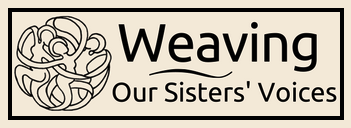Retellings of Biblical Women’s Stories
Brenner, Athalya. I Am-- : Biblical Women Tell Their Own Stories. Minneapolis: Fortress Press, 2005.
- Brenner uses an autobiographical voice to retell a number of women’s stories, employing much research and presenting concepts through an academic lens.
- “What would biblical narratives look like if reread confessedly and unashamedly with modern and postmodern concerns in mind, openly emphasizing concerns voiced by contemporary bible and literature scholars instead of guesses about ‘original’ intentions and conditions?” - Preface, p. X
- WSV women discussed: Tamar, Rahab, Shulammite woman
Rivers, Francine. 2002. A Lineage of Grace. Wheaton, Ill: Tyndale House Publishers.
- Retellings of the five women listed in Jesus’ lineage, narrated as a novel and accompanied with Bible studies for each story.
- WSV women discussed: Tamar, Rahab, Mary Winter,
Miriam Therese. The Gospel According to Mary: A New Testament for Women. New York: Crossroad, 1993.
- A rewriting of the gospels, using the biblical text as a starting point and employing imaginative storytelling, which emulates what a first century gospel written by a woman would look like.
- WSV women discussed: Mary, Elizabeth, Woman with a Hemorrhage
Theatre and Bible Stories
Bial, Henry. Playing God : The Bible on the Broadway Stage. 2015.
- Bial looks at several intersections between religion and theatre, motivations for producing biblically based theatre, and challenges in doing so. Then he analyzes several examples of commercially successful and unsuccessful biblically based theatrical productions.
Biblical Interpretation: Feminist Hermeneutics and Midrash
Barenblat, Rachel. “Transformative Work: Midrash and Fanfiction”. Religion & Literature43.2 (2011): 171–177. Web.
- Barenblat writes on the investment that readers make when they participate in Midrash and how we take ownership in the stories.
Davison, Lisa Wilson. 2006. Preaching the women of the Bible. St. Louis, Mo: Chalice Press.
- Begins by describing feminist hermeneutics and midrash and explaining the difficulties involved in interpreting the Bible. Makes an argument for telling women’s stories in sermons. Then interprets several stories of women from the Bible and gives suggestions on incorporating these stories into sermons.
- WSV women discussed: Mary, Jochebed, Daughters of Zelophehad
Phyllis Bird Missing Persons and Mistaken Identities
- Bird posits that women’s stories in Scripture don’t necessarily provide an accurate reflection of women’s lives in that historical timeframe. She provides historical research on that era and suggests ways in which such research can influence our understanding of Scripture.
Trible, Phyllis. God and the Rhetoric of Sexuality. Overtures to Biblical Theology; 2. Philadelphia: Fortress Press, 1978.
- Trible is a known figure at the forefront of feminist theology. In this work she delves into feminist hermeneutics and “accent(s) what [she] consider(s) neglected themes and counterliterature” in the Bible by presenting the image of God as male and female and feminism as a critique of culture.
- WSV women discussed: Shulammite woman
Trible, Phyllis. Texts of Terror : Literary-feminist Readings of Biblical Narratives. Overtures to Biblical Theology; 13. Philadelphia: Fortress Press, 1984.
- Trible is a known figure at the forefront of feminist theology. In this work she first introduces feminist hermeneutics and then employs these methods of understanding in historical explorations and interpretations of four stories of women from Scripture - Hagar, Tamar (not the one in WSV), the Levite’s Concubine, and Jephthah’s Daughter.
- “If without stories we live not, stories live not without us. Alone a text is mute and ineffectual. In the speaking and the hearing new things appear in the land.” - Introduction, p. 1
- WSV women discussed: Levite’s Concubine
